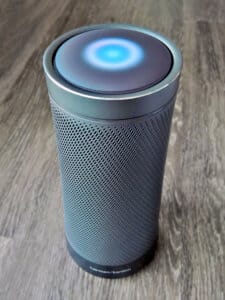Voice search: Hey Siri, what is the future of marketing?
Voice search is widely touted as the new frontier of SEO- but as usual, the devil is in the details.
The line between a dynamic, fast moving industry and getting swept up in trends has never been finer. A stylish presentation or LinkedIn gimmick might be enough to convince many that AR, VR, AI or AMP is the future of marketing. But you’re smarter than that, so you’re drilling into the details. Do you really need to squeeze worrying about voice search marketing into your already crowded schedule?
Here’s what I found for “is voice search the future of marketing?”
A good indicator of what’s really on the horizon for digital marketing can be the priorities of the big firms. And while soothsaying listicles abound, there’s actually very few mentions of voice search outside nerdy SEO forums. Bear in mind- some of these are same sources that have been announcing ‘SEO is dead’ since about 2010.
Meanwhile, the heavy hitters are sweating over data breaches, AI-powered algorithms and, above all quality content. And that final one is a reality check- whatever happens to search in the next 10, 20, or 50 years, on voice search, mobile search or desktop, Google and other engines will always be on the same mission they are on today- to bring customers the best displayed, most useful, well-written and suitable response to any query. Straining to accommodate voice search overlooks the fact that Google holds quality content above all else- and that mission is one SEOs should aspire to, too.
The flip side of the coin is that there is data to show that voice search has shot up in the last few years. Statistics like:
- BY 2020, 50 PERCENT OF ALL SEARCHES WILL BE VOICE SEARCHES
and
- 40% OF ADULTS NOW USE VOICE SEARCH ONCE PER DAY
are certainly emotive- and impressive- but the presumption here is a. that these ratios will keep increasing and b. that those searches are for stuff that concerns your business.
Let me explain that last part. Voice search is in many ways the successor of the mobile search revolution. But the data there is still clear- people are more likely to search on mobile for certain things- local businesses as well as lots and lots of other, little queries, such as who played character X in movie Y. Most of what they consider high value searches- those heavy with intent to buy- still take place on desktop, a pattern that shows no sign of changing. Buying a takeaway? Mobile. Buying a car? Desktop. That doesn’t mean car dealers don’t need to optimise for mobile- something we’ll get into later. The key point for now is, we can presume it’s safe to separate certain types of searches by device. If you’re a local business, or a provider of movie trivia, you should consider mobile your primary platform. If you’re selling cars, your desktop site better be on point- whatever the stats say about mobile being the future of search. People are more complex than statistics.
So what do people use voice search for?
This leads us back to voice search. As we have seen, despite broad patterns of behaviour, drilling into the details show us that different types of searches tend to happen on different devices. So what searches are most likely to happen on voice? This time last year SEM Rush did an excellent study covering this very topic and, well, you remember that impressive statistic those 40% of adults using voice search once a day? It turns out most of them were asking to turn lights on, or play music. The most common request that was actually extracting data was asking for weather reports. Very interesting for data geeks like me, but unless you run a very, very niche business, this is not the groundshaking data some articles would have you believe. This is not to say habits may not change- but in the current landscape, the ‘voice search revolution’ seems to remain some distance away.

What is voice search? A background.
Voice search began with Apple in 2011, when Siri was released as a feature on the iPhone 4S. This was followed with Google Voice Search in 2012, and by Amazon with the Echo and Microsoft’s Cortana in 2014. They quickly moved from hit-and-miss novelty to commonplace household item as AI improved. Now one in ten Brits owns a smart speaker- a huge if so far almost untapped market.
How do you optimise for voice search?
Despite voice search tech having been around for the best part of a decade, we’ve only recently hit the point where their use is widespread enough, and their effectiveness developed enough, to be of interest to SEOs. At this early stage voice search optimisation is mostly comprised providing plenty of FAQs, snippets of useful, Alexa-ready text based around keywords chosen for their vernacular, rather than typed properties. For an example of how keyword strategies differ, on desktop you may type:
Best coffee shops near me
And let the local listings, their ratings, location and reviews, guide you to where you get your morning latte. Easy, no?
If you were outdoors on mobile, though, you might go for an even more direct search, such as
Coffee shops or Coffee near me
Not much shorter, but a little easier to type with those cold, latte-starved fingers.
Now imagine we were getting up in the morning and asked our voice search system where it thought we ought to go for our caffeine fix.
OK Google…where’s the best coffee shop near me or Hey Siri…find a coffee shop near ___ street.
These questions are longer, and though broadly similar, many experienced SEOs feel that the more complete, conversational language requires its own content. This extends to most other searches.
Alexa… who played Freddie Mercury in Bohemian Rhapsody? Is how many people would ask Amazon voice search to track down information on Rami Malek.
Freddie Mercury actor is the form the same question takes for mobile search. See the difference?
So far voice optimisation has not advanced much beyond retooling content and keyword research to account for the forms used by voice search tech. But this is unlikely to remain the situation for long, if Google is serious about giving voice search parity with other areas of search.
So if the revolution is several years away, why bother optimising for voice search in 2019? Well earlier on, I mentioned that desktop-oriented sites could still benefit from (or more likely, be penalised by Google for lack of) mobile optimisation? Well the same could be about to happen for voice. Google has shown it’s willing to proactively intervene in the marketplace through AMP and could potentially decide to weigh in again with initiatives in favour of voice search. So it could be that in the future, elements of voice optimisation become the norm for sites that otherwise aren’t playing the voice search game. But we have to remember, smart speaker ownership is at around 10% of the population- not 95% as with smartphones. And given the mixed reaction Google had with AMP, it may be some time before we see strict limitations to non-voice optimised pages.

So why is voice search important for SEO?
That’s not to say there’s no advantages to optimising for voice search now. As with mobile, it’s likely Google will treat a page optimised for voice as suitable, or even preferable for everything else. To again take mobile as a comparative example- a mobile-optimised site is streamlined, fast, well-structured and lean, all attributes that will help it rank well on desktop too. So in what areas could voice search optimisation overlap with mobile and desktop- to the benefit of all three?
- Voice search is great for long-tail keywords. One area where we may already be seeing Google’s preference for voice is in longer-tail keywords. With the most recent algorithm update weighting strength towards these, and clear data showing search terms are slightly longer on average on voice (as shown above, we pare our searches down when typing), it could be argued that Google is starting to drive traffic toward more specific, less general terms.
- You can use voice search for local marketing. Another area is in local search- the topic of 22% of voice searches (probably the segment most useful from a marketing perspective) according to a study by Internet Trends in 2016. Local search is always a tough environment to compete in, and if voice evolves in this direction we might see genuinely see a new frontier- to your local marketplace- small businesses take note.
- You can use voice search optimisation to promote featured snippets. The third area where your site might benefit from voice search is featured snippets. For the last 12 months or more, Google has been striving to draw focus onto these bite-size nuggets of clear, concise, query-solving goodness. While originally this was thought to be only for the benefit of mobile users, it could also help users find information through voice.
Of course, there are caveats here too. Whereas it was easy for SEOs to get their heads around the diametric desktop vs mobile mindset, and easily explain this to clients, voice adds a third, more complex dimension to the mix. It seems likely that the transition to a voice-optimised internet will be slower and more cautious- though that’s not to say it isn’t on the agenda at Google HQ.
Another aspect to give marketers pause is the impact of voice search- or rather, voice answers. The top result is given 100% of weight and trust (the potentially disastrous effect of which are now well known) and cuts out everything else. Staking out the top of the voice search pack now could be far easier than trying to rank no.1 in 5 years’ time.
In conclusion, yes voice search is coming, but not yet and possibly not to the revolutionary extent that’s been predicted. The pace of change is fast in tech, but a good team and a switched on, proactive mindset keeps you abreast of these challenges. Ultimately though, as was said at the beginning, never compromise quality content to keep up with the predictions of the ‘SEO is dead’ set- that is something Google won’t thank you for.

